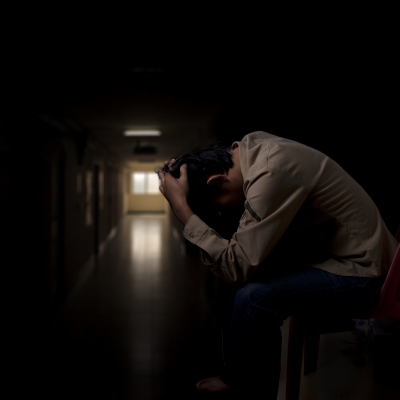‘John’s’ Story: Why Mental Health Matters
May 23, 2014

“John” appeared to have it all—great job, nice house, loving family. But his personal and professional life brought enormous pressures, and a difficult childhood left emotional scars that hadn’t healed.
“Constant fear and depression ruled my life,” John said. “I hid it pretty well, but it kept eating away at me. Finally, there came a day when I couldn’t hold it back anymore. All that pressure and self-doubt just fell in on me. I collapsed at home, weeping uncontrollably, unable to think straight or make a decision. It was the most terrifying day of my life.”
That day ended with John in a hospital, diagnosed with generalized anxiety disorder and clinical depression.
“I wasn’t suicidal, but all the patients were treated as if they were,” explained John. “So I had to sleep every night with the door open, and every five minutes or so an attendant would shine a flashlight in my room to make sure I hadn’t killed myself. That was truly humbling.”
During the day, John attended classes to begin the process of coping and healing—identifying the drivers of his condition, finding coping mechanisms and talking with counselors. He went home after a few days but continued with therapy for the next year and a half. Eventually, with medication and counseling, he was able to deal with the conditions that shattered his life.
“One of the great lessons I gained from that experience is the severity of mental illness,” John said. “It can’t be just ‘wished away’ with positive thinking. It needs to be treated as seriously as any cancer or infectious disease.”
John’s name is fiction, but his tale true. And he isn’t alone in facing the challenge of mental health disorders. According to the National Association of Mental Illness:
One of every four Americans experience mental illness during adult life.
Some 20 percent of teenagers struggle with mental illness, and 70 percent of all young people in the juvenile justice system have a disorder.
An estimated 42 million Americans suffer from anxiety disorders, such as panic disorder, obsessive-compulsive disorder (OCD), post-traumatic stress disorder (PTSD), generalized anxiety disorder and phobias.
The estimated economic impact of serious mental disorders exceeds $193 billion in lost wages.
Given that mental illness is so prevalent, it’s hard to believe there needs to be a Mental Health Awareness Month. But misunderstandings of these disorders persist, and the month of May is a time to educate people.
Beyond education, of course, is action. United Way supports a number of programs in the community that address mental illness and related concerns, including behavioral health through Community Healing Center, childhood trauma through Starr Commonwealth, suicide prevention through Gryphon Place, and many more.
For John, his experience is one he’ll never forget, and one that he hopes can equip him to understand and support others. “Anxiety and depression can happen to anyone,” he said.
![]()
Posted in Change the Story, Health
